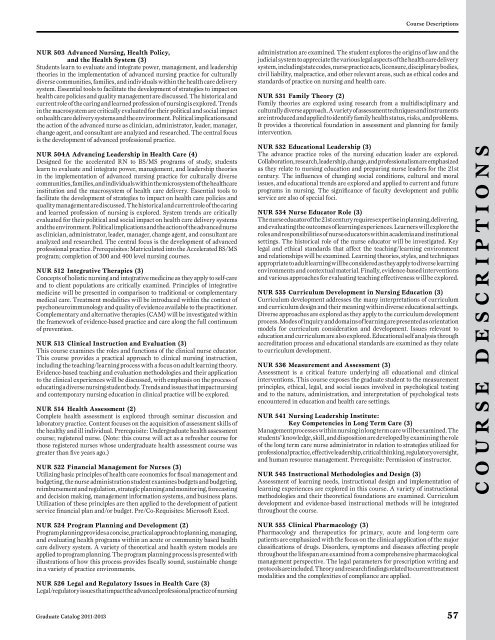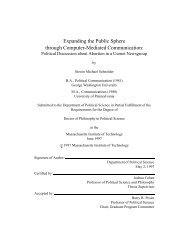Graduate Catalog 2011-2013 - SUNY Institute of Technology
Graduate Catalog 2011-2013 - SUNY Institute of Technology
Graduate Catalog 2011-2013 - SUNY Institute of Technology
Create successful ePaper yourself
Turn your PDF publications into a flip-book with our unique Google optimized e-Paper software.
Course Descriptions<br />
NUR 503 Advanced Nursing, Health Policy,<br />
and the Health System (3)<br />
Students learn to evaluate and integrate power, management, and leadership<br />
theories in the implementation <strong>of</strong> advanced nursing practice for culturally<br />
diverse communities, families, and individuals within the health care delivery<br />
system. Essential tools to facilitate the development <strong>of</strong> strategies to impact on<br />
health care policies and quality management are discussed. The historical and<br />
current role <strong>of</strong> the caring and learned pr<strong>of</strong>ession <strong>of</strong> nursing is explored. Trends<br />
in the macrosystem are critically evaluated for their political and social impact<br />
on health care delivery systems and the environment. Political implications and<br />
the action <strong>of</strong> the advanced nurse as clinician, administrator, leader, manager,<br />
change agent, and consultant are analyzed and researched. The central focus<br />
is the development <strong>of</strong> advanced pr<strong>of</strong>essional practice.<br />
NUR 504A Advancing Leadership in Health Care (4)<br />
Designed for the accelerated RN to BS/MS programs <strong>of</strong> study, students<br />
learn to evaluate and integrate power, management, and leadership theories<br />
in the implementation <strong>of</strong> advanced nursing practice for culturally diverse<br />
communities, families, and individuals within the microsystem <strong>of</strong> the healthcare<br />
institution and the macrosystem <strong>of</strong> health care delivery. Essential tools to<br />
facilitate the development <strong>of</strong> strategies to impact on health care policies and<br />
quality management are discussed. The historical and current role <strong>of</strong> the caring<br />
and learned pr<strong>of</strong>ession <strong>of</strong> nursing is explored. System trends are critically<br />
evaluated for their political and social impact on health care delivery systems<br />
and the environment. Political implications and the action <strong>of</strong> the advanced nurse<br />
as clinician, administrator, leader, manager, change agent, and consultant are<br />
analyzed and researched. The central focus is the development <strong>of</strong> advanced<br />
pr<strong>of</strong>essional practice. Prerequisites: Matriculated into the Accelerated BS/MS<br />
program; completion <strong>of</strong> 300 and 400 level nursing courses.<br />
NUR 512 Integrative Therapies (3)<br />
Concepts <strong>of</strong> holistic nursing and integrative medicine as they apply to self-care<br />
and to client populations are critically examined. Principles <strong>of</strong> integrative<br />
medicine will be presented in comparison to traditional or complementary<br />
medical care. Treatment modalities will be introduced within the context <strong>of</strong><br />
psychoneuroimmunology and quality <strong>of</strong> evidence available to the practitioner.<br />
Complementary and alternative therapies (CAM) will be investigated within<br />
the framework <strong>of</strong> evidence-based practice and care along the full continuum<br />
<strong>of</strong> prevention.<br />
NUR 513 Clinical Instruction and Evaluation (3)<br />
This course examines the roles and functions <strong>of</strong> the clinical nurse educator.<br />
This course provides a practical approach to clinical nursing instruction,<br />
including the teaching/learning process with a focus on adult learning theory.<br />
Evidence-based teaching and evaluation methodologies and their application<br />
to the clinical experiences will be discussed, with emphasis on the process <strong>of</strong><br />
educating a diverse nursing student body. Trends and issues that impact nursing<br />
and contemporary nursing education in clinical practice will be explored.<br />
NUR 514 Health Assessment (2)<br />
Complete health assessment is explored through seminar discussion and<br />
laboratory practice. Content focuses on the acquisition <strong>of</strong> assessment skills <strong>of</strong><br />
the healthy and ill individual. Prerequisite: Undergraduate health assessment<br />
course; registered nurse. (Note: this course will act as a refresher course for<br />
those registered nurses whose undergraduate health assessment course was<br />
greater than five years ago.)<br />
NUR 522 Financial Management for Nurses (3)<br />
Utilizing basic principles <strong>of</strong> health care economics for fiscal management and<br />
budgeting, the nurse administration student examines budgets and budgeting,<br />
reimbursement and regulation, strategic planning and monitoring, forecasting<br />
and decision making, management information systems, and business plans.<br />
Utilization <strong>of</strong> these principles are then applied to the development <strong>of</strong> patient<br />
service financial plan and/or budget. Pre/Co-Requisites: Micros<strong>of</strong>t Excel.<br />
administration are examined. The student explores the origins <strong>of</strong> law and the<br />
judicial system to appreciate the various legal aspects <strong>of</strong> the health care delivery<br />
system, including state codes, nurse practice acts, licensure, disciplinary bodies,<br />
civil liability, malpractice, and other relevant areas, such as ethical codes and<br />
standards <strong>of</strong> practice on nursing and health care.<br />
NUR 531 Family Theory (2)<br />
Family theories are explored using research from a multidisciplinary and<br />
culturally diverse approach. A variety <strong>of</strong> assessment techniques and instruments<br />
are introduced and applied to identify family health status, risks, and problems.<br />
It provides a theoretical foundation in assessment and planning for family<br />
intervention.<br />
NUR 532 Educational Leadership (3)<br />
The advance practice roles <strong>of</strong> the nursing education leader are explored.<br />
Collaboration, research, leadership, change, and pr<strong>of</strong>essionalism are emphasized<br />
as they relate to nursing education and preparing nurse leaders for the 21st<br />
century. The influences <strong>of</strong> changing social conditions, cultural and moral<br />
issues, and educational trends are explored and applied to current and future<br />
programs in nursing. The significance <strong>of</strong> faculty development and public<br />
service are also <strong>of</strong> special foci.<br />
NUR 534 Nurse Educator Role (3)<br />
The nurse educator <strong>of</strong> the 21st century requires expertise in planning, delivering,<br />
and evaluating the outcomes <strong>of</strong> learning experiences. Learners will explore the<br />
roles and responsibilities <strong>of</strong> nurse educators within academia and institutional<br />
settings. The historical role <strong>of</strong> the nurse educator will be investigated. Key<br />
legal and ethical standards that affect the teaching/learning environment<br />
and relationships will be examined. Learning theories, styles, and techniques<br />
appropriate to adult learning will be considered as they apply to diverse learning<br />
environments and contextual material. Finally, evidence-based interventions<br />
and various approaches for evaluating teaching effectiveness will be explored.<br />
NUR 535 Curriculum Development in Nursing Education (3)<br />
Curriculum development addresses the many interpretations <strong>of</strong> curriculum<br />
and curriculum design and their meaning within diverse educational settings.<br />
Diverse approaches are explored as they apply to the curriculum development<br />
process. Modes <strong>of</strong> inquiry and domains <strong>of</strong> learning are presented as orientation<br />
models for curriculum consideration and development. Issues relevant to<br />
education and curriculum are also explored. Educational self analysis through<br />
accreditation process and educational standards are examined as they relate<br />
to curriculum development.<br />
NUR 536 Measurement and Assessment (3)<br />
Assessment is a critical feature underlying all educational and clinical<br />
interventions. This course exposes the graduate student to the measurement<br />
principles, ethical, legal, and social issues involved in psychological testing<br />
and to the nature, administration, and interpretation <strong>of</strong> psychological tests<br />
encountered in education and health care settings.<br />
NUR 541 Nursing Leadership <strong>Institute</strong>:<br />
Key Competencies in Long Term Care (3)<br />
Management processes within nursing in long term care will be examined. The<br />
students’ knowledge, skill, and disposition are developed by examining the role<br />
<strong>of</strong> the long term care nurse administrator in relation to strategies utilized for<br />
pr<strong>of</strong>essional practice, effective leadership, critical thinking, regulatory oversight,<br />
and human resource management. Prerequisite: Permission <strong>of</strong> instructor.<br />
NUR 545 Instructional Methodologies and Design (3)<br />
Assessment <strong>of</strong> learning needs, instructional design and implementation <strong>of</strong><br />
learning experiences are explored in this course. A variety <strong>of</strong> instructional<br />
methodologies and their theoretical foundations are examined. Curriculum<br />
development and evidence-based instructional methods will be integrated<br />
throughout the course.<br />
COURSE DESCRIPTIONS<br />
NUR 524 Program Planning and Development (2)<br />
Program planning provides a concise, practical approach to planning, managing,<br />
and evaluating health programs within an acute or community based health<br />
care delivery system. A variety <strong>of</strong> theoretical and health system models are<br />
applied to program planning. The program planning process is presented with<br />
illustrations <strong>of</strong> how this process provides fiscally sound, sustainable change<br />
in a variety <strong>of</strong> practice environments.<br />
NUR 526 Legal and Regulatory Issues in Health Care (3)<br />
Legal/regulatory issues that impact the advanced pr<strong>of</strong>essional practice <strong>of</strong> nursing<br />
NUR 555 Clinical Pharmacology (3)<br />
Pharmacology and therapeutics for primary, acute and long-term care<br />
patients are emphasized with the focus on the clinical application <strong>of</strong> the major<br />
classifications <strong>of</strong> drugs. Disorders, symptoms and diseases affecting people<br />
throughout the lifespan are examined from a comprehensive pharmacological<br />
management perspective. The legal parameters for prescription writing and<br />
protocols are included. Theory and research findings related to current treatment<br />
modalities and the complexities <strong>of</strong> compliance are applied.<br />
<strong>Graduate</strong> <strong>Catalog</strong> <strong>2011</strong>-<strong>2013</strong><br />
57
















